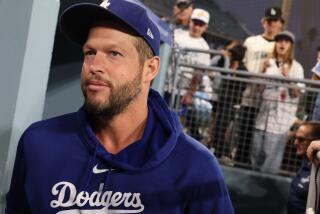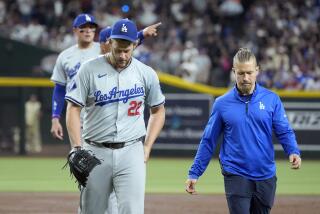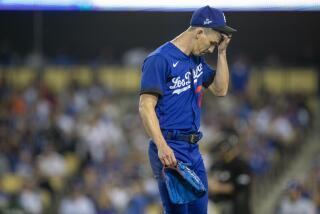McCaskill Is Back : It Took Time, but the Mystery of Angel Pitcher’s Ailing Elbow Finally Solved
MESA, Ariz. — The worst year in the life of Kirk McCaskill has been in the book for almost two months now, and if the Angel pitcher could somehow arrange a burning of that book, they’d be roasting media guides in Mesa tonight.
“I’m glad ’88 is here,” McCaskill says, throwing out the first understatement of the spring. “And look. The Tigers let Kirk Gibson go to the Dodgers. It’s already shaping up as a great year.”
McCaskill begins to laugh, and it’s a double-edged laugh. There are two jokes at work here, one obvious and one inside.
Of course, McCaskill is glad that Gibson’s gone. He’s an American League pitcher, isn’t he? But at the same time, McCaskill knows fully well that pitching to the left-handed slugger was among the least of his problems in 1987.
Just getting to pitch was the hardest part.
At first, his principles wouldn’t let him. Last spring, McCaskill walked out of camp in protest of what he regarded as “strong-arm” tactics during contract negotiations by Angel General Manager Mike Port. Faced with a take-it-or-take-a-salary-cut proposition, McCaskill held out for six days before Port agreed to place the Angels’ original offer of $232,000 back on the table.
McCaskill finally signed and readied himself to pitch again.
Then, his arm wouldn’t let him.
Three starts into the regular season, McCaskill was diagnosed as having bone spurs in his right elbow. On April 27, he underwent arthroscopic surgery and didn’t make his next start until July 16.
From there, things really fell apart.
McCaskill, a 17-game winner in 1986, was only 2-6 with a 6.88 earned-run average after surgery. Worse than that, the arm still hurt. On Sept. 4, McCaskill, making what would be his final start of the season, surrendered a grand slam to Mike Pagliarulo and a solo home run to Rickey Henderson in three innings, left the game and complained that his elbow felt “worse than before.”
At the advice of the Angel trainers, McCaskill was placed on ice--”shut down,” in baseball parlance. McCaskill didn’t pick up another baseball until January and didn’t begin throwing off the mound again until Feb. 1.
One week into spring training, McCaskill remains the leading question mark on a pitching staff filled with them. Was four months rest enough to repair the second-most important right elbow in the Angels’ starting rotation? Can McCaskill reasonably expect to approach his 1986 form--and the Angels subsequently approach theirs? Or were the Angels’ earlier claims of “cautious optimism” about McCaskill too optimistic and not nearly cautious enough?
It’s still early, but so far, McCaskill is responding with exclamation points.
“McCaskill is throwing good, as good as I’ve ever seen him,” Angel Manager Gene Mauch says. “And he’s got all his pitches with him. He’s cracking down on his fastball, he’s cracking down on his curveball.
“I was watching him the other day, and I said to Lach (pitching coach Marcel Lachemann), ‘You mean, he feels nothing? ‘ Hell no, he feels nothing.”
Mauch, of course, has been known to paint landscapes rosy and rosier, but there seems to be a growing consensus around the Angels’ camp that McCaskill’s comeback may be the real thing. Catching prospect Erik Pappas came off the field one afternoon last week shaking his head and raving to McCaskill about the pitches he had just seen.
McCaskill, too, is shaking his head these days. He claims to be as surprised as anyone about his progress to date.
“After I threw on Wednesday, I was doing my running and I was kind of waiting for my arm to start hurting,” he said. “I kept wondering when it was going to stiffen up. But it never did.
“That’s a nice feeling--to have no feeling there.”
And it’s a quite a change from McCaskill’s wintry winter outlook, when the arm hurt without McCaskill doing so much as holding a baseball.
“October, November, December, the arm was very painful,” McCaskill said. “I didn’t think I’d ever be ready for spring training.”
It wasn’t until December that McCaskill and Angel physical therapist Roger Williams finally discovered the root of McCaskill’s discomfort. Unlike most pitchers after elbow surgery, McCaskill’s problem wasn’t with arm extension but just the opposite. Because scar tissue had hardened in the joint, McCaskill was unable to properly flex--or close--his elbow.
“We never realized the problem was with flexion,” McCaskill said, curling an imaginary dumbbell to mimic the painful motion.
“What happened was when I first came back last year, my arm felt pretty good and I kind of stopped rehab. I got my extension back pretty quickly, so I stopped doing my stretching exercises.”
That, McCaskill now concedes, was among his biggest mistakes of 1987.
“Basically, I never stretched out the scar tissue,” he said. “Eventually, all the scar tissue collapsed in the joint, and it got worse and worse. That’s why the arm started hurting progressively every time I pitched. It’d feel OK for a couple innings, but with the third, fourth and fifth innings, it would just get stiffer and stiffer.”
Williams and McCaskill unlocked the mystery one December day when, basically, they unlocked his arm.
“It was really weird,” McCaskill remembered. “In early December, Roger started stretching my arm. It was so painful, and we just couldn’t get it out, but finally, the arm straightened out.
“Then, it was like we ‘broke’ it. The pain went away, and I got started on the right stretching regimen.”
Another mistake McCaskill admits to is rushing his return to the rotation last season. At the time, the Angels were spinning their wheels around the .500 level, staying within striking range of first-place Minnesota. McCaskill, sitting idly by, couldn’t wait to get back and maybe make a difference.
“Everybody and his brother told me to take it slowly, but I wouldn’t listen,” he said. “I wanted to be out there so badly. I remember walking into Gene’s office (in mid-July) and telling him, ‘I’m ready. I want to be there.’ I felt like I was the key.”
There’s a pause and then, glumly, McCaskill adds: “Instead, I was a liability.”
Back in July, McCaskill had the wrong role model. He kept referring to the 1986 case of John Candelaria, who also underwent elbow surgery in late April, returned by mid-July and went on to finish 10-2.
McCaskill’s thinking: Same injury, same surgery. . . . Same comeback trail.
“I thought I’d be out two months and then come back to win 10 or 11 games,” he said. “I had based everything on John the year before. That was probably my biggest problem. I never took into account our different body styles, our different throwing styles.”
Or the fact that Candelaria’s rapid recovery was, by baseball standards, a fluke. “I think John was atypical of most pitchers who have the kind of surgery we had,” McCaskill said.
So, McCaskill went on to learn the hard way. Yet, today he says: “I can’t honestly say that I’d do it any differently if I could. At the time, it was the thing to do. I would hope everybody who plays the game of baseball would feel the same way. If you love playing baseball, you can’t stand being away from it.”
On the other hand, there is a time to walk away from the game, when necessary, McCaskill believes. Such as last spring, when Port imposed an early contract deadline on his unsigned players and made a $232,000 offer to McCaskill--with the threat of a $7,000 cut if the pitcher didn’t agree to it on the spot.
McCaskill didn’t agree to it. Instead, he walked out of camp--on the spot.
“I’d still do it again--100 times, if you asked me to,” McCaskill says of his walkout. “I didn’t get any more money out of it--I ended up signing for their first offer. But the contract was not the main issue. It was a matter of treatment, of how I was being treated.”
Wally Joyner is making the same contention--and taking the same stand--by staying out of camp this spring. McCaskill was asked if he thought Joyner was taking the proper strategy.
“That’s a real tough call,” McCaskill said. “Wally’s got to do what he feels is right.
“I back Wally Joyner 100%. . . . that’s based on friendship. Our families got together three or four times during the winter and we talked about this situation. We saw it coming.
“Hopefully, five or six years down the road, Wally will look back and not even think this was a big deal. But right now, it sure feels like a big deal.”
McCaskill, too, is unsigned for 1988, but he’s taking a considerably lower profile than last spring. That’s partly because the Angels, despite McCaskill’s washed-out 1987 season, are not asking him to take a pay cut.
“The Angels have been sensitive to my situation,” McCaskill said. “I don’t think this is the year I need to be hammered in negotiations. The first contract they sent me was for the same salary. So, this year, so far, there’s hasn’t been any problem.”
McCaskill says he is devoting this spring to the pursuit of other numbers--such as, say, 15 victories or so. The Angels will need just about that many from him if they are to get serious about challenging the vastly improved Oakland A’s, Kansas City and Minnesota in the AL West.
“I know people regard our pitching as a question mark,” McCaskill said. “I think that’s fair. The Oakland A’s will be contenders--if their pitching’s good. I don’t think that’s an uncommon state. In our regard, it’s if our pitching is healthy.”
As of late February, McCaskill swears he’s healthy. That’s one. And if he stays that way, Mauch envisions grandiose plans for 1988.
“I’d like to see a Comeback Player of the Year award sitting in his locker,” Mauch says of McCaskill.
“I’d like to see it, too,” McCaskill agrees. “I think we’re on the right track.”
More to Read
Go beyond the scoreboard
Get the latest on L.A.'s teams in the daily Sports Report newsletter.
You may occasionally receive promotional content from the Los Angeles Times.






